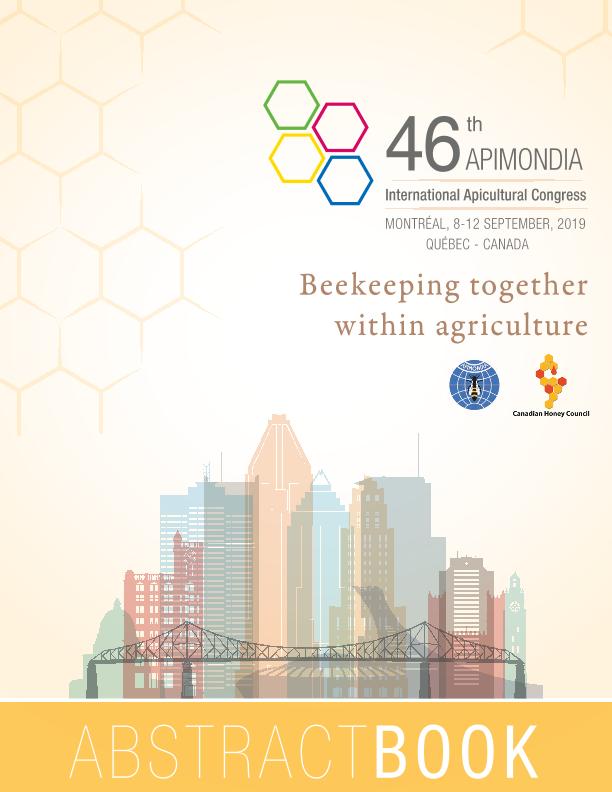Evento
Understanding the differential hygienic behavior towards drone brood in Apis mellifera colonies from Argentina
Dowd, D. Duggan; Muntaabski, Irina ; Russo, R. M.; Landi, L.; Lanzavecchia, S. B.; Cladera, J. L.; Palacio, M. A.; Bedascarrabure, E.; Scannapieco, Alejandra Carla
; Russo, R. M.; Landi, L.; Lanzavecchia, S. B.; Cladera, J. L.; Palacio, M. A.; Bedascarrabure, E.; Scannapieco, Alejandra Carla ; Liendo, María Clara
; Liendo, María Clara
 ; Russo, R. M.; Landi, L.; Lanzavecchia, S. B.; Cladera, J. L.; Palacio, M. A.; Bedascarrabure, E.; Scannapieco, Alejandra Carla
; Russo, R. M.; Landi, L.; Lanzavecchia, S. B.; Cladera, J. L.; Palacio, M. A.; Bedascarrabure, E.; Scannapieco, Alejandra Carla ; Liendo, María Clara
; Liendo, María Clara
Tipo del evento:
Congreso
Nombre del evento:
46th Apimondia International Apicultural Congress: Beekeeping together within agriculture
Fecha del evento:
08/09/2019
Institución Organizadora:
International Federation of Beekeepers' Associations;
Canadian Honey Council;
Título del Libro:
46th Apimondia International Apicultural Congress: Abstract Book
Editorial:
International Federation of Beekeepers' Associations
ISBN:
978-88-944531-0-2
Idioma:
Inglés
Clasificación temática:
Resumen
Brood diseases of Apis mellifera colonies constitute a main problem of beekeeping worldwide. Worker bees display a social health mechanism that consists in detecting, uncapping and removing dead or diseased brood from the hive: the hygienic behavior (CH). These activities are induced by olfactory cues and have been described as associated to hygiene of brood parasitized by Varroa destructor. This mite have preference for drone brood, but the efficiency of CH towards their cells is significantly lower compared with cells of worker brood, being left uninspected by workers. Some authors suggest that a possible cause of the CH differences is due to the cell wax cap of drone brood (thicker than worker cells) acting as a barrier to volatile compounds and obstructing disease detection. The aims of this research were to study the differential CH towards worker and drone brood belonging to highly hygienic colonies from Argentina, and to explore the importance of drone cell wax cap as an interfering factor in the transmission of chemical signals. To this end, removal percentages of pin-killed worker and drone brood were recorded and an innovative cell wax cap exchange was implemented in three different treatments: pin-killed worker pupa with a healthy drone cell wax cap; a healthy worker pupa with a pin-killed drone cell wax cap; and a healthy worker pupa covered with a healthy drone cell wax cap (control). Results showed a greater removal towards worker cells than drone cells. For the cell wax cap exchange experiment, we found that the removal of pin-killed worker pupae covered with healthy drone cell wax cap was significantly high, while the removal of healthy worker pupae covered with pin-killed drone opercula was low. These preliminary results confirms a differential behavior between both type of brood cells and suggests that the cell wax cap of drone brood is not interfering the detection of chemical compounds from the diseased brood by worker bees, regardless the thickness. This work contributes to a better understanding of the detection activity of different types of diseased brood and provides information useful to control strategies of varroosis and other brood diseases.
Palabras clave:
HYGIENIC BEHAVIOR
,
DRONE
,
CELL WAX CAP
,
PIN-KILLED
Archivos asociados
Licencia
Identificadores
Colecciones
Eventos (IABIMO)
Eventos de INSTITUTO DE AGROBIOTECNOLOGIA Y BIOLOGIA MOLECULAR
Eventos de INSTITUTO DE AGROBIOTECNOLOGIA Y BIOLOGIA MOLECULAR
Citación
Understanding the differential hygienic behavior towards drone brood in Apis mellifera colonies from Argentina; 46th Apimondia International Apicultural Congress: Beekeeping together within agriculture; Québec; Canadá; 2019; 232-232
Compartir



